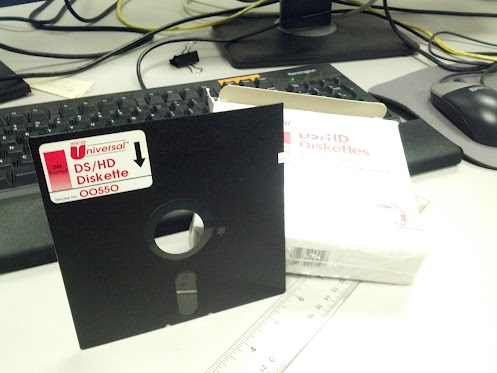Blast from the Past
I happened to be scrounging through the supply cabinet at work and found this relic of the computing world, a 5.25″ floppy disk. Putting them in the cabinet may have just been someone’s idea of a joke, but it brings up the very real point of dealing with legacy data and compatibility. If there was anything on the floppy, it was probably so old that it couldn’t possibly be important to us anymore, but if it was, the chances of finding a computer on the premises that could read it would be slim to nil. Now as a mechanical engineer, I don’t typically encounter legacy operating systems (COBOL, anyone?), but I have had to dig up some very old technical drawings. I was working on a radar system upgrade and had to pull up technical drawings from the radar’s original construction in the 1960’s. The drawings were stored on microfiche, and…
The Big (Employment) Squeeze
It’s funny how information tends to come in waves. Recently, I came across two articles that had similar themes about different victims. The first was the notion that engineers that are over 35 are essentially unemployable. The opinion piece from CNN discusses how “older” workers are perceived as too expensive to hire. It also discusses how the point of mass layoffs is to eliminate the older, more expensive workers and foist more work on less people. Fluxor has discussed the reality of this situation in many of his posts. Shortly before this article came out, another one showed up on Bloomberg. This one had the age of unemployability as 40, but around the same ballpark. All of this has been discussed often on EngineerBlogs. However, what brought this to mind was an article I came across a few weeks ago. This one talked about the other end of the employment…
Year Two Began Anew…
…and it’s kicking my ass, as you can probably tell from my lack of posting. Last October, I posted on how I was diving right into the deep end (see: What’s the difference between 18 and 27?) because my feeling was that academia is sink or swim and those that can cope will, and those that can’t cope won’t. I was most decidedly in the camp that thought they could cope and things would be easier once I got a grant or two under my belt. This led to a, shall we say, promiscuous year applying for any and all proposal solicitations that were remotely in my area (~10 NSF-length proposals, and ~10 smaller opportunities). I wanted to make sure I got some funding in the first year to get off to a good start. It turns out that when you get more than 1 or 2 grants under your belt,…
Ex-pat Engineers in Shanghai
It’s been a bit quiet here on EngineerBlogs lately. Everyone is no doubt busy with their real jobs, myself included. The reason is for me is simply workload. As an ex-pat, you are expected to communicate with HQ on a regular basis. The only ex-pats that don’t need to deal with such odd hours are ex-pat engineers. After being here for 2 months, I’ve only met 1 ex-pat engineers — a fellow from France that sits 10 ft. away from me. Every other ex-pat that I’ve met that does engineering related work are engineering managers, myself included. Unfortunately, the ex-pat high tech community isn’t all that large. So far, I’ve met an analog IC manager from TI and an IT director from Alcatel-Lucent. Almost everyone else works for companies noted for their mechanical engineering products — GM, Ford, Volvo, and a few other companies that cater to big manufacturing industries…
Manufacturing, USA vs. Abroad
Lately, I’ve been looking for manufacturers for an injection molded project I’m working on. Requirements at my previous job forced us to source parts in the US, and most of our work was CNC’d aluminum, so exploring overseas suppliers is a new prospect for me. There are some clear advantages to staying in the US and I thought I’d talk about the pros and cons running through my head. Trust The first concern I have with a supplier is trust. Can I trust them to make quality goods and deliver on time? In the US, I feel like basic interview questions and social cues will lead me to conclude whether you’re a worthy supplier or not. I can call you on the phone (because at most you are a few time zones away!), communicate with you in fluent English, and also check your references, who probably also speak English. If…
Weekend Journal — The Value Of School Lies In Opportunity
I’ve been pretty down on higher education lately. Rising costs that don’t seem to equate to raising educational levels, a large amount of mismanagement of funds and schools’ increasingly brazen one-ups-man-ship in terms of building larger buildings and offering unnecessary perks to students. I don’t like it. But I’m a bit hypocritical. I’m a graduate of an engineering program that taught me quite a bit, in buildings that were just a touch larger than they needed to be. Further, I encouraged my wife when she expressed a desire to go back to school this semester to try out a completely different field. So why was I ok with that? Access. In my case, access to facilities. Access to faculty capable of teaching me difficult concepts. And most importantly, access to co-ops and potential employers. Similar reasons abound in my wife’s case, though she’ll be taking many of her classes online,…
6 Ways to Finish Your Projects
I often work on many projects at once. Finishing a project gives me great pleasure- I like to look at it, talk about it, and feel the sense of accomplishment that is nearly analogous to a runner’s high. But getting there takes some practice at the skill of Finishing Stuff. Universally, it is recognized that the last 10% of the project is 90% of the work. I’d say that the first third of the project is 2% of the work. Can someone do the curve and put it in the comments? Why is it so tough to finish projects and so easy to start them? Starting is easy, involving large portions of researching, discussion and shopping. These tasks don’t actually involve producing any results but they feel as though something has been accomplished. Making something out of nothing, to design something or to build something where it wasn’t in existence before…
Getting my groove back
Last week, I complained on my own blog about how I wasn’t looking forward to school starting. In the meantime, it has started, and I’ve made it through the first week of classes. Now that I’m starting to get back in the groove, I’m looking at things a different way. First, as much as I love summer, I like the fact that my life is now moving back into a predictable, albeit busy, routine. I have certain days I’ll be teaching, certain days where I take my dogs to class, certain days I’ll be running my kids to events, and certain meetings that I simply cannot avoid. Taken as a whole, I really like having a schedule and knowing where and when I need to be a certain place. Summer, with it’s lack of structure, sometimes leaves me feeling a bit lost. Second, I’m happy to be teaching again. I…
So You’re Starting Grad School…
The new school year is rapidly approaching, or has perhaps already arrived for some. As one of the resident graduate students here at EngineerBlogs, I thought I’d offer some advice to anyone embarking on the quest that is the US doctoral degree. On my own blog, I’ve offered advice about questions to ask on visits. So now that you’ve matriculated, what’s next? Accept that everyone is going to have advice, and much of it may be completely irrelevant to your department and situation. Learning to parse large amounts of information to find something relevant is a critical skill in graduate school, so consider this practice. Make sure you have all of the requirements for candidacy/graduation written down in one place. What courses do you need to take? How are your qualifying exams structured? When are you expected to achieve candidacy? In the beginning, you’re still going to have courses, but you’ll want to…
Weekend Journal — Social Capital
I threw a BBQ last night. The food and drink, though not cheap, was delicious. All of the guests complimented me on my ability to bend smoke and heat to my will and tame the fibers of a beef brisket. Really I did this because my wife decided she wanted to have a party for friends and family, but it got me thinking about the concept of social capital. Do I trade food for friends? No. Do I think giving someone a slice of brisket will necessarily endear me to them? Nope. Even if there’s lots of free beer to go along with it? Nah. Do I think good things happen when you bring people together and help cross polinate your social groups and try to find commonalities among them? You bet your brisket I do. Remember, you don’t have to have a reason to hang out with friends. But…


